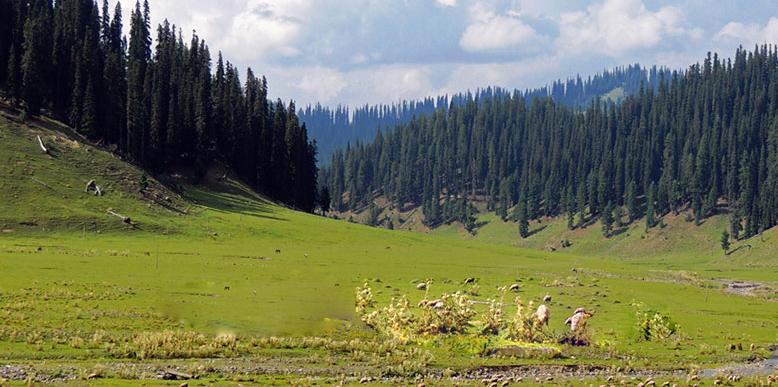J&K: Tribal Claims in Forest Areas to Resurface After Abrogation of Art 370

Srinagar: Jammu and Kashmir administration is staring at another major crisis with the implementation of Forest Conservation Act after October 31, as tribals and residents of forest areas may again claim their rights on forest land use, which were deemed settled under the erstwhile state’s forest act.
According to a senior forest official, the rights of people including tribals in and around forest area were settled in 1912, much before the tribal law was implemented in the country. “The rights and concessions were settled in favour of people much before, which is why J&K did not require its own tribal law,” the official said.
The state forest policy which governed the region’s forests until now were enacted under the erstwhile Dogra regime (1846-1947). The settlement was carried out under Kashmir forest notice in 1912 to demarcate forests in the province of Kashmir concerning concession of forest produce to villagers as well as the regulation of the exercise of the same.
“We may have to resettle the claims and concessions of people living in the villages in and around the forest land with the change of laws and rules,” the official said.
Also read: Forest Rights Act vs Indian Forest Act: Conservation or Conservatism
Around 50% of the total land area in Jammu and Kashmir is under forest cover. The total area in Kashmir province under forest department’s cover is around 8,000 sq km which is divided into three circles – Northern circle covering areas in Kupwara, Handwara, Gurez, Srinagar circle including areas in Bandipora, Gulmarg, Srinagar, Pattan and Southern circle including areas in South Kashmir like Anantnag, Pulwama and Shopian.
As the government abrogated Article 370 on August 5 and bifurcated Jammu and Kashmir into two union territories, the region guided by Jammu and Kashmir Forest Act was also scrapped with the implementation of Jammu and Kashmir Reorganisation Act from October 31.
Forests in Jammu and Kashmir have witnessed enormous depletion, especially in the last three decades owing to climate change, construction for various developmental projects and acquisition by security forces despite monetary compensation to the forest department for afforestation against the acquisition.
With the implementation of the central Forest Act, the tribal communities and forest dwellers have been empowered to reclaim their rights over forests. So far, the state forest laws, according to tribal activists, only gave grazing rights to forest dwellers.
“The central Forest Act will benefit tribes and forest dwellers in the region,” activist Talib Hussain told NewsClick.
Under the central law, a forest dwelling family can now, apart from grazing, have exclusive rights over 32 kanals of land which can be partly used for cultivation as well. The family can also build houses on forest land and use the land for several other purposes except for selling it.
Also read: Dire Need of a Legal Definition of Forest in India
There were about 12 tribal communities in the erstwhile state of Jammu and Kashmir of which 8 lived in the Ladakh province, which is a separate union territory now. Tribal activist and researcher Javaid Rahi also acknowledged that the central forest act has empowered the tribals of the region.
“The tribals in Jammu and Kashmir were fighting for several rights including forest rights since years but many of these laws could not be extended. The tribals and forest dwellers will benefit in terms of several social and livelihood claims,” Rahi said.
Get the latest reports & analysis with people's perspective on Protests, movements & deep analytical videos, discussions of the current affairs in your Telegram app. Subscribe to NewsClick's Telegram channel & get Real-Time updates on stories, as they get published on our website.
























